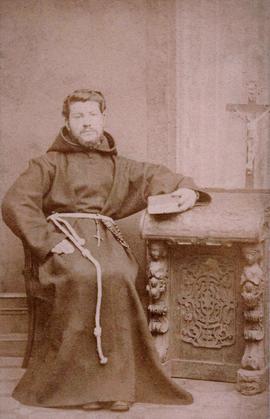Peter Quinn, the son of Thomas and Teresa Quinn, was born in Rhode, King’s County (Offaly), on 3 December 1888. He joined the Capuchin Order in the novitiate at Rochestown, County Cork, in August 1906, taking Raphael as his religious name. His degrees were taken at the National University of Ireland, and he also spent some time studying in the Gregorian University in Rome. Following the completion of his ecclesiastical studies in Rochestown, he was ordained to the priesthood in Holy Trinity Church, Cork, on 5 July 1914. After working for some years in Kilkenny, he travelled to the United States in 1919. He was appointed Pastor in Ukiah, California, in 1922. Here his energy was devoted to the building of St. Mary’s Church and supervising improvements to the adjoining presbytery. The church was opened and blessed by the Most Rev. Edward J. Hanna, Archbishop of San Francisco, on 25 March 1924. Fr. Quinn was also responsible for the building of St. Anthony’s Parish Church in Willits (just north of Ukiah) in Mendocino County, California. Aside from his parochial duties, he was also well known for his ministry to Native Americans (most notably the Pomo Indians of California). In 1925 he was elected Pastor and Superior of Sacred Heart Parish in Lincoln, Nebraska. He remained in Lincoln for nine years, building a new parish church and school. He was also responsible for bringing the Sisters of the Blessed Virgin Mary from Dubuque (Iowa) to teach in the local parochial school and served as chaplain in the state penitentiary. In 1932 a fire (caused by a faulty radio) engulfed the Lincoln parish rectory building. Adam Sassenberger, the parish caretaker who was staying at the house at the time, perished in the blaze. Raphael Quinn suffered serious injuries in the incident from which he never fully recovered. He returned to Ukiah in 1934 and remained there until his death (following a long illness) on 6 February 1940. He was buried in the Catholic Cemetery in Ukiah.
Baptismal name: Peter Quinn
Religious name: Fr. Raphael Quinn OFM Cap.
Date of birth: 3 Dec. 1888
Place of birth: Rhode, County Offaly (Diocese of Kildare & Leighlin)
Name of father: Thomas Quinn
Name of mother: Teresa Quinn (née Dunne)
Date of reception into the Capuchin Order: 26 Aug. 1906
Date of first profession: 17 Sept. 1907
Date of final profession: 21 Jan. 1912
Date of ordination (as priest): 5 July 1914
Educational attainments: BA, 1911
Missionary assignments: Travelled to the United States in Nov. 1919
Date of death: 6 Feb. 1940
Place of death: Ukiah, California










